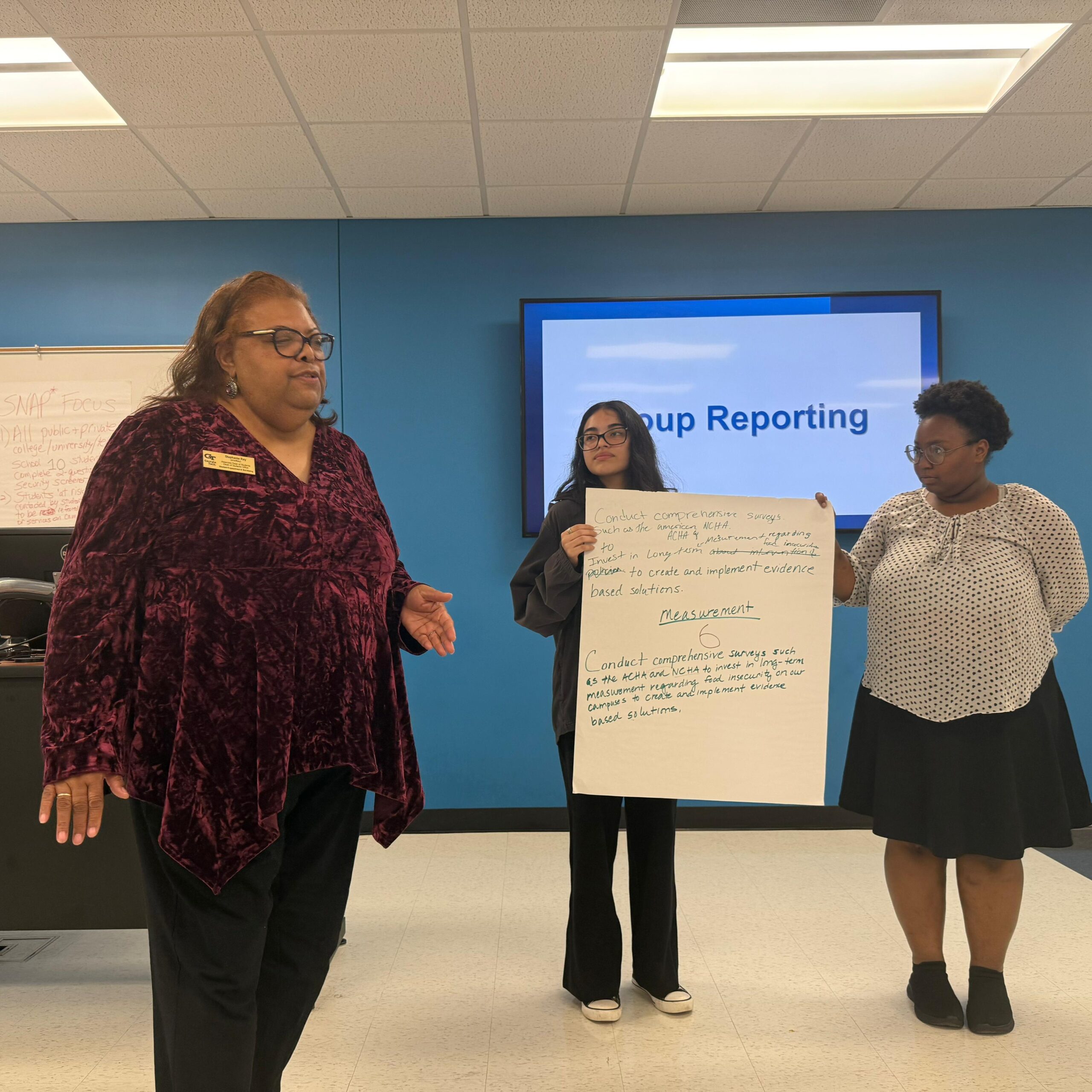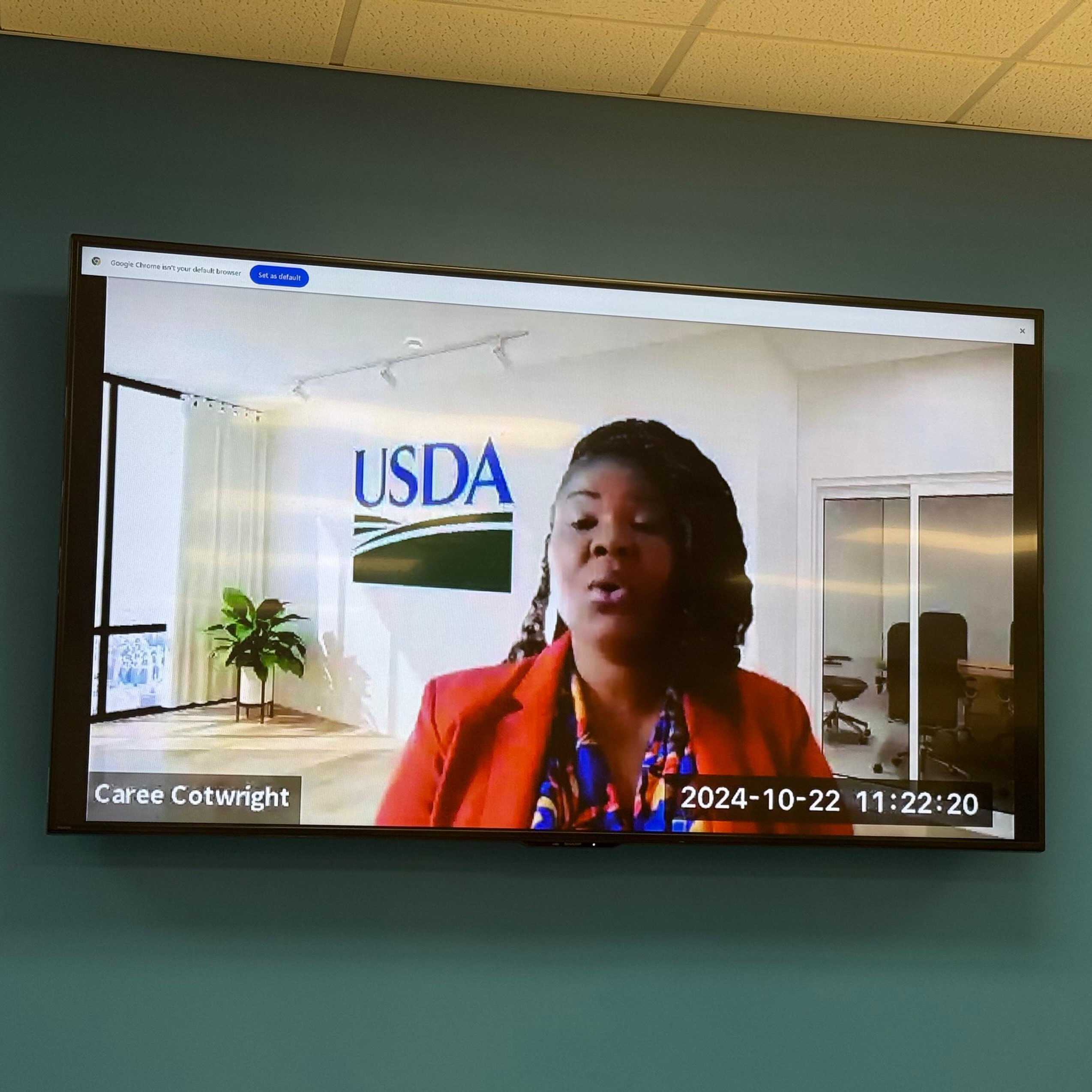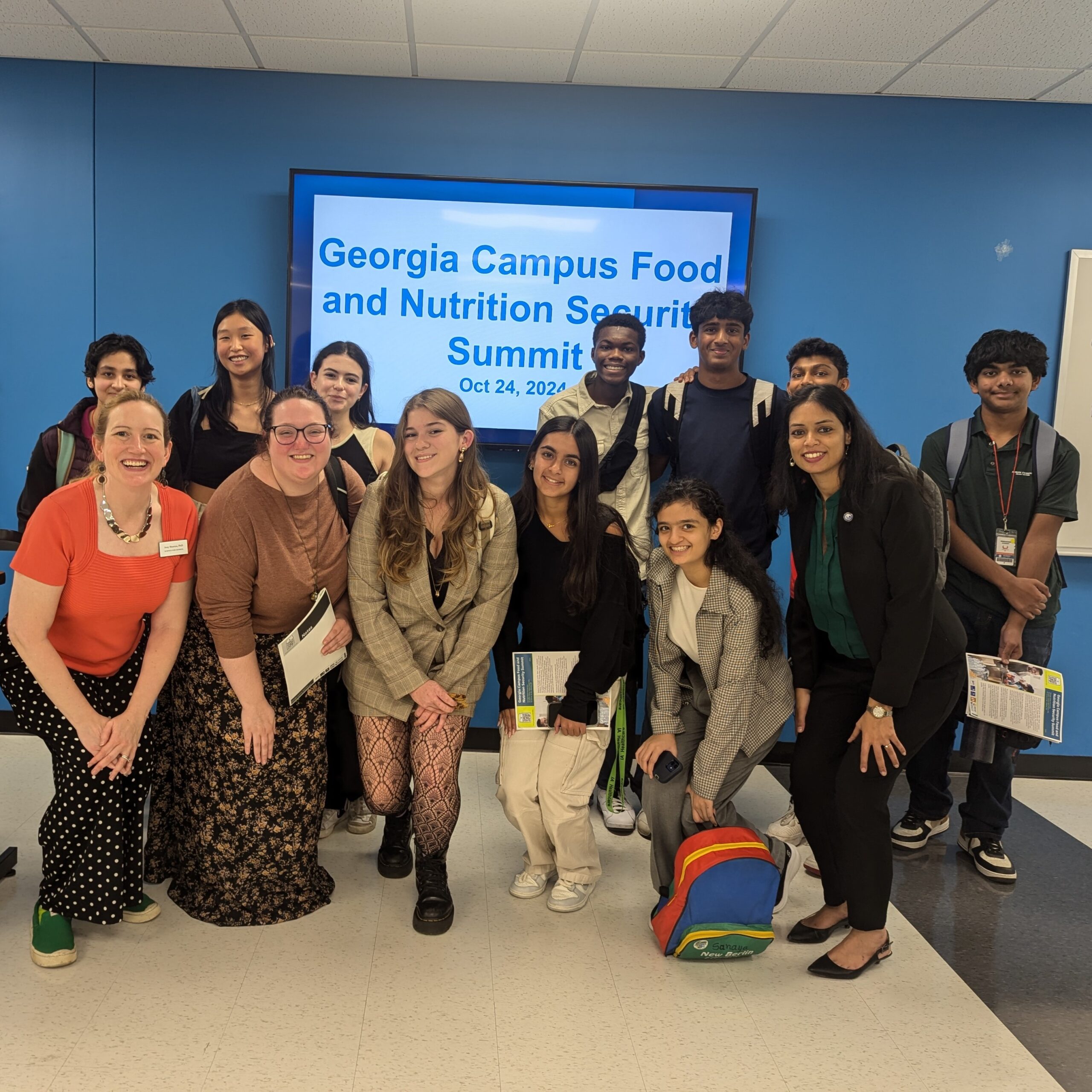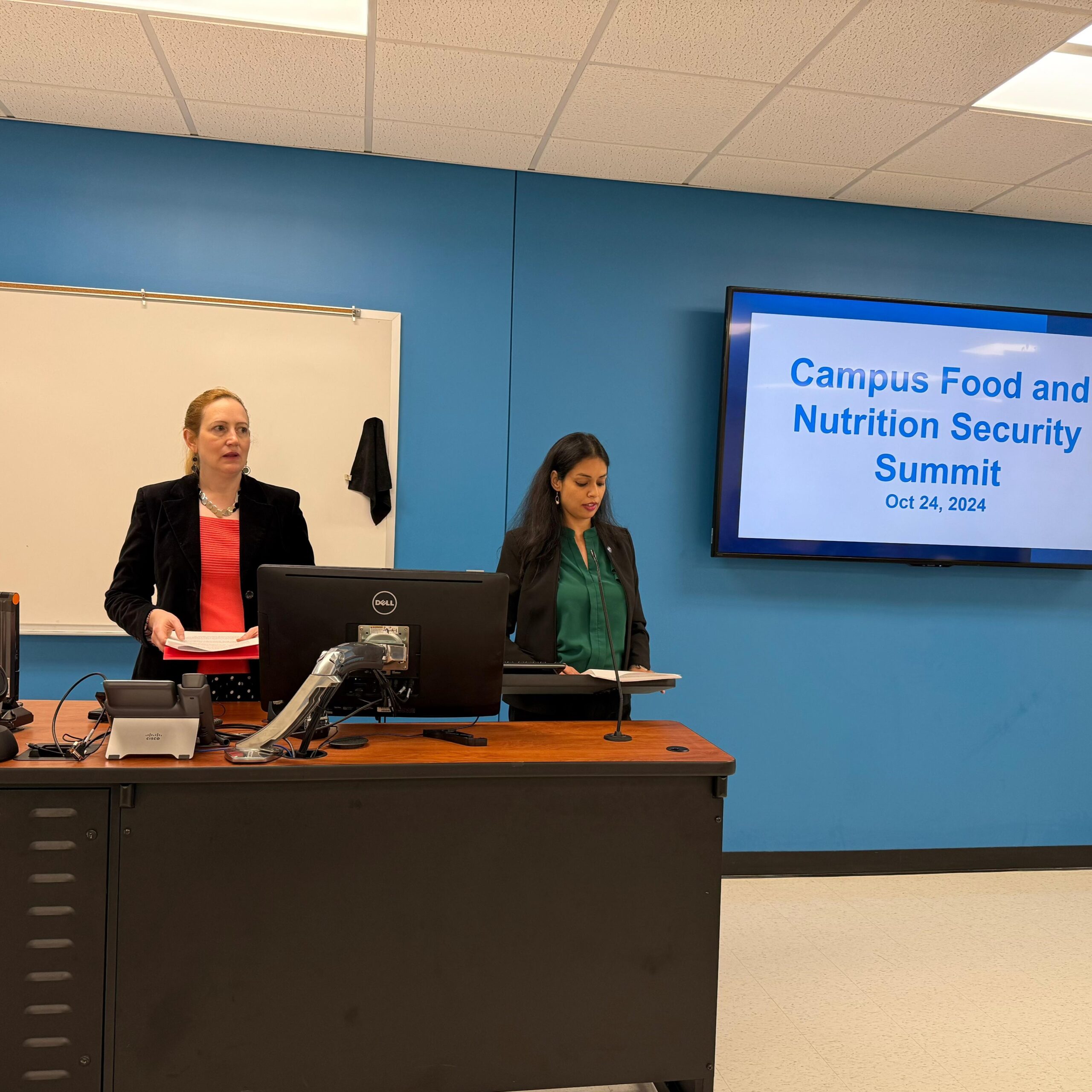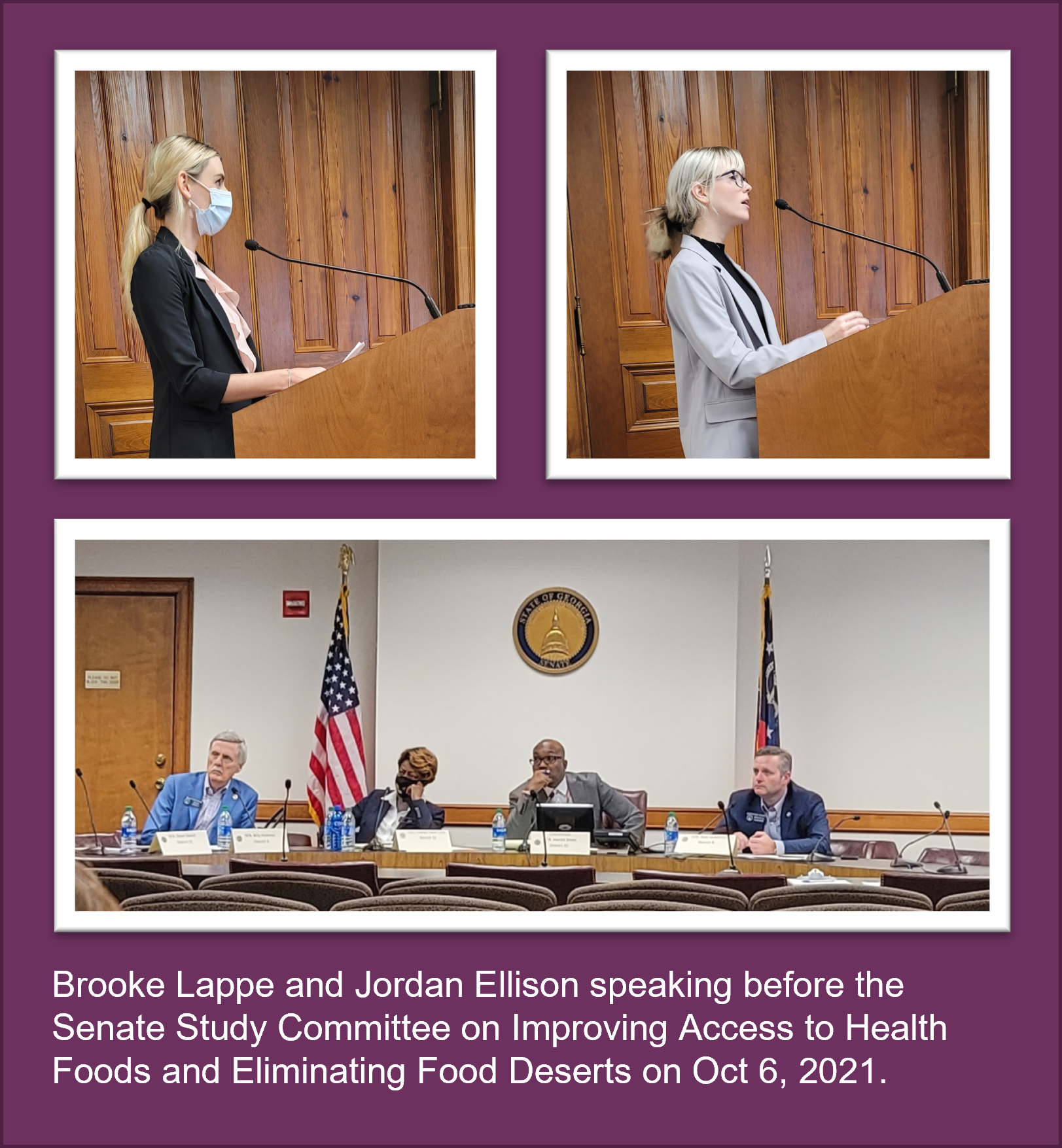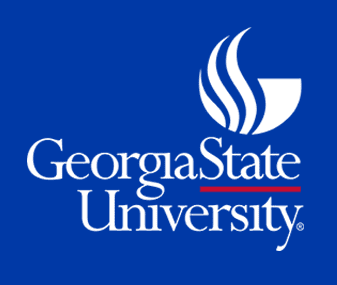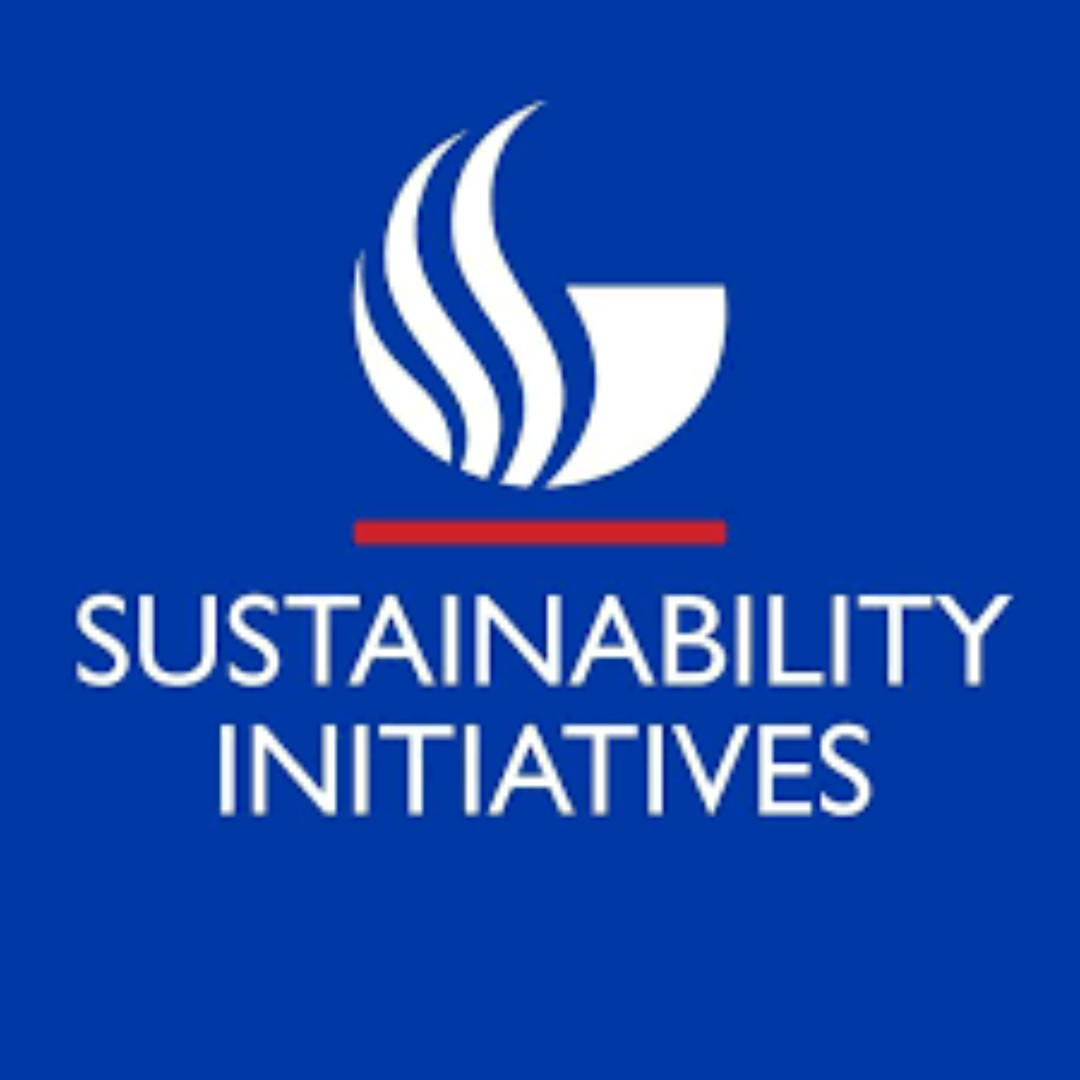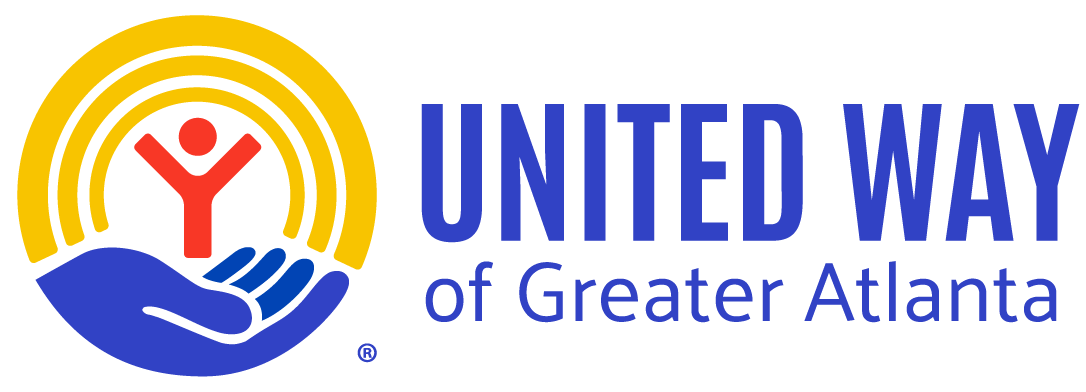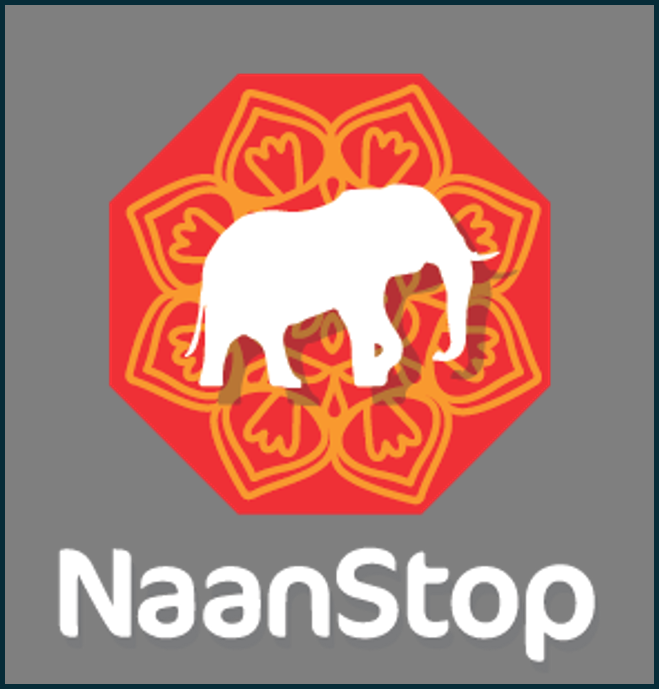Science for Georgia and Georgia State University are proud to have convened the Georgia Campus Food and Nutrition Security Summit on October 24, 2024. Facilitated by Dr. Amy Sharma of Science for Georgia and Dr. Nida Shaikh of the Department of Nutrition at Georgia State University, the summit brought together stakeholders from 17 universities and 5 non-profit organizations across Georgia. They discussed experiences addressing food insecurity on their respective campuses and in the community. The morning consisted of short presentations from each stakeholder. It began with campus professionals and students showcasing the work they’ve done at their universities to improve food and nutrition access. These presentations were followed by remarks from Atlanta-area advocates who are also doing work on college campuses to combat food insecurity. After lunch, participants broke into small groups to discuss food security solutions and then presented their ideas to the group as a whole. After the event, participants stayed and mingled over a cookie happy hour.
Among the presenters that work in food access on college campuses, a consensus emerged that data collection is crucial to supporting students. Food pantries collect data on the number of students that visit the pantries and often conduct polls on campus to measure general food insecurity. But an overall, comprehensive, measurement of the rates of food insecurity among students and the proportion of students who need basic needs services, be that food, housing, or healthcare, is lacking. One speaker mentioned that his university was going to create a Food Access Map, in collaboration with Dr. Shaikh, for students, faculty, and staff to locate places where food is available on campus including Halal, Kosher, vegan, and vegetarian options. However, each speaker spoke with the undertone that their resources are limited. Funding is not dependable, which impedes the ability to establish reliable aid. Each department maximizes its budget to serve as many students as possible, but it’s never enough. Multiple speakers mentioned that they rely on donations or must limit student visits to their food pantry.
The afternoon of the summit was dedicated to interactive breakout sessions and group discussions. Participants divided into smaller groups to tackle some of the challenges discussed in the morning session such as funding, outreach strategies, awareness and utilization of SNAP (formerly food stamps) among students, and meeting diverse needs. These sessions fostered a collaborative environment where attendees could share successful initiatives and brainstorm solutions. The day concluded with group presentations, where representatives from each breakout session shared their insights.
Recommendations
- Awareness. Food insecurity among college students is a hidden issue. Students are unaware that they are food insecure and/or ashamed to talk about it. Just as there has been a focus to destigmatize mental health, a similar one is needed to shine a light on food insecurity. An awareness campaign was suggested. In concert with student groups, students sharing stories of their lived experiences and campus services sharing what is available, would define, destigmatize, and raise awareness and utilization of support services.
- Community Building. Food is an excellent way to bring people together. It was suggested that campuses look into building “community kitchens” that are linked to the campus food gardens. In these shared spaces would be cooking classes, gardening classes, information about support services, and access to nutritious food.
- A centralized comprehensive dashboard that provided information and services such as I have / I need, location of free or reduced-price food, public benefit screenings, nutrition information, and a general support services FAQ would increase access, awareness, and measurement of support services and need.
Resources
SNAP Information
Campus Specific Information
Georgia State University
Panther’s Pantry (GSU), Watch a neat video and take a virtual tour.
GSU Interactive Food Access Map
Kennesaw State University
CARE services – food, water, shelter, safety.
Middle Georgia State University
Knights Table & Office of Student Care.
Background Information
Science for Georgia held a food roundtable in Sept 2021. Over 4 hours, approximately 25 people who work in food organizations in Georgia, met, reviewed the state of food insecurity, and identified 3 evidence-based solutions that are short-term steps toward a long-term solution to ending limited or uncertain access to adequate food.
As a result, we:
Agenda
Welcome:
Dr. Amy Sharma, Executive Director, Science for Georgia
Dr. Nida Shaikh, Assistant Professor, Department of Nutrition, Georgia State University
Welcome Remarks:
Dr. Huanbiao Mo, Dean, GSU Lewis College of Nursing and Health Professions
Leslie Mack, Assistant Director, Nutrition Services, Georgia State University
Dr. Halley Rilley, Data Services Specialist, Research Data Services Department, GSU Library, Georgia State University
Lauren Fournier, Director, KSU CARES at Kennsaw State University
Elaine Martin, Student Care Case Manager and Managers, Knight’s Table (Food Pantry). Swipe Out Hunger recipient/Share free resources, from Middle Georgia State University
Abbi Flagg, Student CARE coordinator, Agnes Scott
Brienne McDaniel, Director of Student Life, Overseas Highlander House (food pantry), Gordon State College:
DJ Roberts, Care Case Manager Off Campus Housing Initiatives and Manager, Open Paws Food Pantry, Augusta University
Dr. Melissa Olfert, Professor of Human Nutrition and Foods, Davis College of Agriculture and Natural Resources, West Virginia University
Esha Venkat, Sophomore, Public Policy at Georgia Tech and Co-founder and COO, NEST4US
Sudip Agrahari, Undergraduate Research Assistant, Nutrition, and Sophomore, Computer Information Systems, Georgia State University
Kendra Gibeaut, Junior, Acting, Georgia State University
Kamore Campbell, Scholarship Coordinator, College AIM and recipient, Invisible Food Pantry
Patti Ghezzi, Founder, Invisible Food Pantry
Enid Draluck, Co-Founder, Metro Atlanta Food Consortium
Charles Sterne, Senior Director for Economic Stability, United Way of Greater Atlanta
Wrap Up:
Dr. Amy Sharma, Executive Director, Science for Georgia and Dr. Nida Shaikh, Assistant Professor, Department of Nutrition, Georgia State University
Closing remarks:
Dr. Micheal Sanseviro, Vice President, Dean of Students, Georgia State University
Dr. Caree Cotwright Remarks
Director of Nutrition Security and Health Equity at the United States Department of Agriculture, Food and Nutrition Service provided remarks for the event. Read the transcript below.
00:00:05.000 –> 00:00:12.000
Greetings, Georgia Campus Food and Nutrition Security Summit. My name is Caree Cotwright.
00:00:12.000 –> 00:00:18.000
I am the director of nutrition security and health equity at the United States Department of Agriculture, Food and Nutrition Service.
00:00:18.000 –> 00:00:24.000
I am on lead from the University of Georgia. So I’m working as a professor in the Department of Nutritional Sciences.
00:00:24.000 –> 00:00:35.000
So I give you a Hardy Go Dogs. Born and raised in Atlanta, Georgia and currently raising my 3 daughters in the Atlanta area, it truly wants my heart to be a part of this inaugural summit.
00:00:35.000 –> 00:00:41.000
I’m so sorry I was not able to draw you in person because I had an existing travel conflict.
00:00:41.000 –> 00:00:48.000
As a child benefited from the achievements of the civil rights era, which Atlanta proudly serves as the cradle of.
00:00:48.000 –> 00:01:03.000
I am excited that more than 80 attendees from 17 universities across Georgia are joined together today to think through ways to collaborate collaboratively advance food and nutrition security across our college campuses and communities.
00:01:03.000 –> 00:01:11.000
Most of my career has focused on helping young children eat healthy, but as a college professor at the University of Georgia on leave.
00:01:11.000 –> 00:01:25.000
I know firsthand the realities of college. Food and security. I also know the power of our USDA federal nutrition assistance and nutrition education programs, which I will highlight today.
00:01:25.000 –> 00:01:38.000
Almost 2 years ago in March of 22, Secretary Billsack launched an effort at USDA to tackle food and nutrition insecurity, which we know often too often impacts college students.
00:01:38.000 –> 00:01:48.000
I am privileged to move this work forward by engaging partners like college students here today and across the country at creating solutions for this problem.
00:01:48.000 –> 00:01:58.000
As a part of our efforts to advance food and interest security, we are working to leverage the historic White House conference on hunger, nutrition, and health and help accelerate progress on the White House conference goals.
00:01:58.000 –> 00:02:07.000
These goals are ambitious, but with each of you here on our team, I know we can’t achieve them.
00:02:07.000 –> 00:02:17.000
These bow goals are to end hunger, improve nutrition and physical activity, and reduce diet related diseases and disparities.
00:02:17.000 –> 00:02:25.000
Let me say those bold calls again to any grade, improve nutrition and physical activity and reduce that related diseases and disparities.
00:02:25.000 –> 00:02:32.000
And I truly hope with help from each of you that we can. In that related diseases and disparities.
00:02:32.000 –> 00:02:40.000
My late father was a civil rights. And I lost him to heart disease and cancer shortly after graduating from Howard University.
00:02:40.000 –> 00:02:48.000
Far too many of us have had a loved one that we lost. Way too early. This is preventable.
00:02:48.000 –> 00:03:02.000
And software. Over the last 2 years, the Biden has administration has pushed all federal agencies to drive to advance equity, including health equity, through policies, programs, and practices.
00:03:02.000 –> 00:03:15.000
At USDA, we have been focusing our efforts on changes that would have the greatest potential for ensuring equitable access to healthy, safe, and affordable foods, including on college campuses.
00:03:15.000 –> 00:03:30.000
We are also working to build awareness among us and key partners about the sizable body of research indicating that structural racism harms well health in ways that can be described, measured, and dismantled.
00:03:30.000 –> 00:03:41.000
And we are also carefully examining our existing and potential policies to identify ways to prioritize health equity and address the social determinants of health.
00:03:41.000 –> 00:03:48.000
This is where nutrition security comes in and where we at USDA and each of you here today can have influence.
00:03:48.000 –> 00:03:55.000
You are trusted messengers on your college campuses across this country and you can elevate the power.
00:03:55.000 –> 00:04:04.000
Okay, federal nutrition assistance programs like SNAP. Our work includes having each of our agencies across the department to develop equity plans.
00:04:04.000 –> 00:04:15.000
We also established the 1st USDA Equity Commission and are holding ourselves accountable to external feedback on how we can do better to advance equity.
00:04:15.000 –> 00:04:34.000
We are proud of our efforts to date, but we know we have a lot more work to do. And we know that we will be able to go further and do better and go faster working with each of you here today to ensure our college students are nourished while they study and set themselves up for short and long-term success.
00:04:34.000 –> 00:04:54.000
Since launching our food and nutrition security initiative about 2 and a half years ago, USBA has come to define nutrition security to mean that we are ensuring everyone in this country has consistent and access to healthy, safe, and affordable foods essential to optimal health and well-being.
00:04:54.000 –> 00:05:05.000
That there are 2 core motivations for this evolution. The 1st is the promotion of health equity, which means that everyone has a fair and just opportunity to be as healthy as possible.
00:05:05.000 –> 00:05:14.000
The second is the recognition that structural inequities make it hard for many people to eat healthy and to be physically active.
00:05:14.000 –> 00:05:26.000
Our food and nutrition security work at USDA is scaffolded by 4 pillars. First, st we are working to provide meaningful nutrition support from pregnancy to birth and beyond.
00:05:26.000 –> 00:05:44.000
Second, we are working to connect everyone in this country with healthy, safe, and affordable food resources. 3, rd we are developing translating and enacting nutrition science through partnership and forth and throughout all of this work we are prioritizing equity.
00:05:44.000 –> 00:05:54.000
Every step of the way. As you’ll hear from USDA colleagues and Snap advocates today, we have a lot of resources about Snap eligibility among students.
00:05:54.000 –> 00:06:00.000
Far too often students don’t know if they’re eligible for SNP or even know how to apply.
00:06:00.000 –> 00:06:07.000
And for some students pride or statement may get in the way. To advance food and nutrition security among our college students.
00:06:07.000 –> 00:06:20.000
Each of you have the power to build a awareness of snap eligibility and enrollment. You also have the power to change the narrative about participating in federal nutrition assistance programs.
00:06:20.000 –> 00:06:37.000
They work. They help lift individuals out of poverty and address food insecurity. For students. Snap can help alleviate worries about where a next meal might come from and let them focus on their studies and building momentum towards their lifelong success.
00:06:37.000 –> 00:06:50.000
So today, I hope that each of you individually and collectively discuss innovative ways to build awareness about student eligibility for SNP and equally important how to navigate the application process.
00:06:50.000 –> 00:07:00.000
I know USDA resource that helps tackle food and nutrition and security among college students is the emergency food assistance program or tea fat for short.
00:07:00.000 –> 00:07:14.000
This program supports states with USDA foods that can supply college food pantries. Researchers show that college food pantries can help eliminate student barriers to accessing healthy, safe, and affordable foods.
00:07:14.000 –> 00:07:22.000
Many universities participate in TEPE as distribution sites under the auspices of a larger food pantsy or food bank.
00:07:22.000 –> 00:07:31.000
And I am happy to help to connect you with your state TEFFAT point of contact to learn more about the program or your state’s eligibility criteria.
00:07:31.000 –> 00:07:37.000
I also want to elevate the role of Snap Inn in addressing college food insecurity. Snap it, provide step at providers can assist college students who may be.
00:07:37.000 –> 00:08:07.000
Food and secure by partnering with campus-based food pantries or social service providers. These projects and interventions can include providing technical assistance and read and educational resources on healthy donations and nutrient dense food selections to site partners and conducting in-person or virtual lessons with cooking demonstrations utilizing pantry items or on food resource management.
00:08:09.000 –> 00:08:20.000
For example, the university in Georgia, where I’m from. Works. Very closely with Snap It to with and the university food based pantry.
00:08:20.000 –> 00:08:29.000
And we’re very excited about that work. As a professor, my diatetic students would also prepare cooking demonstrations in partnership with that local food.
00:08:29.000 –> 00:08:40.000
Another example is the Missouri Council for Activity and Mitration, also called as Mokane. They collected information about food and security and have a nutrition program.
00:08:40.000 –> 00:08:56.000
For utilization among students at 2 and 4 year colleges in Missouri. The results are informing ways that campuses, campus pantries, snap outreach and snap it are working together to improve support the support network for students.
00:08:56.000 –> 00:09:02.000
And a 3rd and final example is California Snap A program which implemented This snap is, excuse me, their cow fridge.
00:09:02.000 –> 00:09:13.000
They’ll be living on college campuses project through the Center for Healthy Communities at California State University Chico.
00:09:13.000 –> 00:09:24.000
This project has encouraged healthier campus environments by implementing policy systems and environmental changes in areas identified by campus needs assessments.
00:09:24.000 –> 00:09:36.000
I would love to hear about ways that any attendees today are working with Snap in it or I would love to commit you with potential Snap Bad funded projects in your state.
00:09:36.000 –> 00:09:52.000
And Lance, I want to encourage each of you to use my plate materials. And messages. My plate is the federal symbol for healthy eating and it has a robust selection of recipes and ideas for eating healthy on a budget.
00:09:52.000 –> 00:10:04.000
You’re universities of food and security committees. Can become my plate national strategic partners. So in closing, I want to encourage each of you to continue your great work and emphasize how right now we have a window of opportunity to take these powerful nutrition assistance programs.
00:10:04.000 –> 00:10:26.000
The federal government like Snap to do even more. This includes the work that each of you do at your respective campuses and the power of your collective work today during today’s Inaugural Sunday.
00:10:26.000 –> 00:10:33.000
I’ll get to encourage each of you listening today to think about how you can step in and step up and lean in.
00:10:33.000 –> 00:10:39.000
Even if you think it’s a small step, they will all add up and can make a meaningful difference.
00:10:39.000 –> 00:10:51.000
Your voices matter. Please help us to build awareness about our programs, help us maximize our assets, and help us to build new and enhanced collaborations.
00:10:51.000 –> 00:11:00.000
Let me wrap up with a heartfelt thank you to all of you for the important work that you do every day to help college students thrive.
00:11:00.000 –> 00:11:16.000
I am excited to work with all of you on these critical issues and have no doubt that today student leaders and listeners will be a critical part of our efforts to advance food and nutrition security in my home state of Georgia and across our great nation.
00:11:16.000 –> 00:11:25.000
Please reach out if I can be of help. My email is simply my name. It’s kari.com write at usca.
00:11:25.000 –> 00:11:31.000
Please have a fantastic summit and enjoy your time. Thank you.


